|
|
Publications
Global Reports
|
1.
|
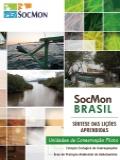
|
SocMon Brasil Síntese Das Lições Aprendidas
, 2017, Portuguese
View Abstract
N/A
Download
|
|
2.
|
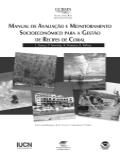
|
Manual de Avaliação e Monitoramento Socioeconômico para a Gestão de Recifes de Coral
L. Bunce, P. Townsley, R. Pomeroy, R. Pollnac, 2017, Portuguese
View Abstract
N/A
Download
|
|
3.
|
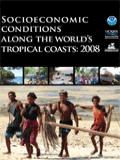
|
Socioeconomic conditions along the world’s tropical coasts: 2008
Loper, C., R. Pomeroy, V. Hoon, P. McConney, M. Pena, A. Sanders, G. Sriskanthan, S. Vergara, M. Pido, R. Vave, C. Vieux and I. Wanyonyi, 2008
SocMon Global Report, 2008. 56pp
View Abstract
EXECUTIVE SUMMARY
The world’s tropical coasts are home to over two billion people, many of whom live in
poverty and depend on coastal resources such as coral reef fish for their livelihood, sustenance, and cultural traditions. This report synthesizes data from individual socioeconomic assessments to quantify and qualify regional and global dependence on coral reef resources, perceptions of resource conditions, threats to marine and coastal resources, and support for marine management strategies such as marine
protected areas. Data are included from 49 studies, representing close to 14,000 household surveys conducted in hundreds of communities in 27 countries.
This information provides evidence of the need to conserve global coral reef resources to ensure food security and contribute to poverty alleviation. It is clear that declining quality of coral reefs negatively impacts those communities dependent on coral reefs for food, income, and revenue from tourism. However, new coral reef conservation initiatives such as the Micronesia Challenge, the Caribbean Challenge, the Coral Triangle Initiative, and the Indian Ocean Challenge will provide the opportunity to understand better the impacts of developing marine protected areas (MPAs) on livelihoods of people, both positively and negatively.
Predominantly MPAs have been shown to bring positive consequences for the livelihoods of local people in the long-term, however it should be recognized that there are often negative impacts on some sectors of the local populations in the short term. These include the loss of access rights to habitual fishing grounds or increased risk of peril of travelling further to access alternative fishing grounds. Socioeconomic monitoring is needed to understand and mitigate negative impacts where needed, such as provision of alternative livelihoods. Gleaning at low tide in India. Socioeconomic conditions along the world’s tropical coasts.
There are now six regions throughout the world which are successfully conducting socioeconomic monitoring through the SocMon Initiative: wider Caribbean; Central America; Southeast Asia; Western Indian Ocean; Pacific Islands; and South Asia. In some regions, initiatives other than SocMon have provided the bulk of the socioeconomic monitoring data, such as the Locally Managed Marine Areas (LMMA) network which operates throughout the Pacific and in parts of Southeast Asia. The LMMA network has conducted full socioeconomic monitoring at 49 of their 342 sites...
Download
|
|
4.
|
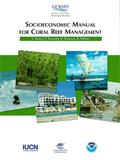
|
Socioeconomic manual for coral reef management.
Bunce, L., P. Townsley, R. Pomeroy and R. Pollnac, 2000
Global Coral Reef Monitoring Network, Australian Inst. Marine Science, Townsville, Australia, 251 p.
View Abstract
This manual is intended to help reef managers understand the steps in a socioeconomic assessment, and provide practical guidelines on how to conduct baseline socioeconomic assessments of coral reef stakeholders. The step-by-step process in this manual can be used to assess the socioeconomic background of coral reef stakeholders. The social, cultural and economic issues are discussed as well as the organisation and resource governance of coral reef management.
The socioeconomic information collected and the processes suggested here will help reef managers in management, development, research, monitoring and policy at a site. The baseline information may also contribute to national, regional and international comparisons of data, which are useful for science and policy-making.
This manual will also be used to gather socioeconomic information in parallel with biophysical assessments and monitoring being conducted by the Global Coral Reef Monitoring Network (GCRMN) and Reef Check. Both involve collecting data on corals, fishes, other biota and physical parameters using transect lines across the reef. Reef Check works with communities and volunteers who have limited experience and training (see methods in www.reefcheck.org). GCRMN monitoring (methods in English et al. 1997) gathers more data on more parameters along the transects, but requires more training and takes more time than Reef Check protocols. The goal of GCRMN and Reef Check is to gather biophysical and socioeconomic data at the same time, and often with the same team collecting both types of data. This combination of biophysical and socioeconomic information will assist reef managers in sustainable management of the resources.
Download
|
* To access site reports, please click
here.
Regional Guidelines
|
1.
|
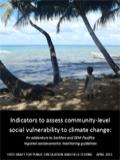
|
Indicators to assess community-level social vulnerability to climate change: An addendum to SocMon and SEM-Pasifika regional socioeconomic monitoring guidelines
Wongbusarakum S. and C. Loper, 2011
The Nature Conservancy and the NOAA Coral Reef Conservation Program.
View Abstract
N/A
Download
|
|
2.
|

|
Socioeconomic Monitoring Guidelines for Coastal Managers in South Asia: SocMon South Asia
Hoon, V., G. Sriskanthan, P. Townsley, B. Cattermoul, L. Bunce And B. Pomeroy, 2008
IUCN/CORDIO
View Abstract
These guidelines are intended to provide guidance for conducting a socioeconomic assessment in the South Asia region, including determining assessment objectives, selecting indicators, collecting data, and analyzing data, and using the resulting information for adaptive management. Use of these guidelines is ideally accompanied by hands-on training; please contact your regional SocMon coordinator regarding upcoming training opportunities in your region.
Download
|
|
3.
|
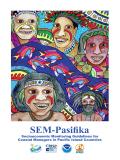
|
SEM-Pasifika: socio-economic monitoring guidelines for coastal managers in Pacific Island Countries
Wongbusarakum, S., B. Pomeroy, C. Loper, C. Vieux, M. Guilbeaux, A. Levine and C. Bartlett, 2008
Secretariat of the Pacific Regional Environment Programme, Apia, Samoa, 139pp.
View Abstract
These guidelines are intended to provide guidance for conducting a socioeconomic assessment in the Pacific Islands region, including determining assessment objectives, selecting indicators, collecting data, and analyzing data, and using the resulting information for adaptive management. Use of these guidelines is ideally accompanied by hands-on training; please contact your regional SocMon coordinator regarding upcoming training opportunities in your region.
Download
|
|
4.
|

|
Socioeconomic Monitoring Guidelines for Coastal Managers of the Western Indian Ocean: SocMon WIO
Malleret-King, D., A. Glass, I. Wanyonyi, L. Bunce and B. Pomeroy, 2006
CORDIO East Africa Publication (Version 1) pp108.
View Abstract
These guidelines are intended to provide guidance for conducting a socioeconomic assessment in the Western Indian Ocean region, including determining assessment objectives, selecting indicators, collecting data, and analyzing data, and using the resulting information for adaptive management. Use of these guidelines is ideally accompanied by hands-on training; please contact your regional SocMon coordinator regarding upcoming training opportunities in your region.
Download
|
|
5.
|

|
Lineamientos de Monitoreo Socioeconómico para Administradores Costeros en el Caribe: SOCMON Caribe
Bunce, L. and B. Pomeroy, 2003, Spanish
World Commission on Protected Areas and Australian Institute of Marine Science, 2003
View Abstract
These guidelines are intended to provide guidance for conducting a socioeconomic assessment in the Caribbean region, including determining assessment objectives, selecting indicators, collecting data, and analyzing data, and using the resulting information for adaptive management. Use of these guidelines is ideally accompanied by hands-on training; please contact your regional SocMon coordinator regarding upcoming training opportunities in your region.
Download
|
|
6.
|

|
Socioeconomic monitoring guidelines for coastal managers in the Caribbean: Socmon Caribbean.
Bunce, L. and B. Pomeroy, 2003
World Commission on Protected Areas and Australian Institute of Marine Science, Australia.
View Abstract
These guidelines are intended to provide guidance for conducting a socioeconomic assessment in the Caribbean region, including determining assessment objectives, selecting indicators, collecting data, and analyzing data, and using the resulting information for adaptive management. Use of these guidelines is ideally accompanied by hands-on training; please contact your regional SocMon coordinator regarding upcoming training opportunities in your region.
Download
|
|
7.
|

|
Socioeconomic Monitoring Guidelines For Coastal Managers In Southeast Asia: SOCMON SEA.
Bunce, L. and B. Pomeroy, 2003
World Commission on Protected Areas and Australian Institute of Marine Science, Townsville, Australia. 85p.
View Abstract
These guidelines are intended to provide guidance for conducting a socioeconomic assessment in the Southeast Asia region, including determining assessment objectives, selecting indicators, collecting data, and analyzing data, and using the resulting information for adaptive management. Use of these guidelines is ideally accompanied by hands-on training; please contact your regional SocMon coordinator regarding upcoming training opportunities in your region.
Download
|
Workshop Reports
|
1.
|

|
SocMon Central America Workshop Report 2007
Sanders, A., 2007
Fotomemoria del Taller sobre Metodología Participativa de
Monitoreo Socioeconómico para la Región de la Costa
Norte de Honduras realizado del 27 al 30 de marzo de 2007.
View Abstract
N/A
Download
|
|
2.
|

|
SocMon Central America Workshop Report 2005
Sanders, A., 2005
Fotomemoria del primer taller con administradores costeros de Centroamérica, México y el Caribe.
View Abstract
N/A
Download
|
Newsletter
|
1.
|

|
SOCMONITOR
Pena, M. and P. Edwards (Eds.), 2018
SocMon Newsletter, Issues 20, February 2018
View Abstract
N/A
Download
|
|
2.
|

|
SOCMONITOR
Pena, M. and P. Edwards (Eds.), 2015
SocMon Newsletter, Issues 18, December 2015
View Abstract
N/A
Download
|
|
3.
|

|
SOCMONITOR
Pena, M. and P. Edwards (Eds.), 2015
SocMon Newsletter, Issues 17, July 2015
View Abstract
N/A
Download
|
|
4.
|

|
SOCMONITOR
Pena, M. and P. Edwards (Eds.), 2015
SocMon Newsletter, Issues 16, January 2015
View Abstract
N/A
Download
|
|
5.
|

|
SOCMONITOR
Pena, M. and P. Edwards (Eds.), 2014
SocMon Newsletter, Issues 15, July/August 2014
View Abstract
N/A
Download
|
|
6.
|

|
SOCMONITOR
Pena, M. and P. Edwards (Eds.), 2014
SocMon Newsletter, Issues 14, January 2014
View Abstract
N/A
Download
|
|
7.
|

|
SOCMONITOR
Pena, M. and P. Edwards (Eds.), 2013
SocMon Newsletter, Issues 13, July 2013
View Abstract
N/A
Download
|
|
8.
|

|
SOCMONITOR
Pena, M. and P. Edwards (Eds.), 2013
SocMon Newsletter, Issues 12, April/May 2013
View Abstract
N/A
Download
|
|
9.
|

|
SOCMONITOR
Pena, M. and P. Edwards (Eds.), 2013
SocMon Newsletter, Issues 11, January 2013
View Abstract
N/A
Download
|
|
10.
|

|
SOCMONITOR
Pena, M. and P. Edwards (Eds.), 2012
SocMon Newsletter, Issues 10, October 2012
View Abstract
N/A
Download
|
|
11.
|

|
SOCMONITOR
Pena, M and C. Loper (Eds.), 2012
SocMon Newsletter, Issues 9, August 2012
View Abstract
N/A
Download
|
|
12.
|

|
SOCMONITOR
Pena, M and C. Loper (Eds.), 2012
Socmon Newsletter, Issues 8, April 2012
View Abstract
N/A
Download
|
|
13.
|

|
SOCMONITOR
Pena, M and C. Loper (Eds.), 2012
Socmon Newsletter, Issues 7, February 2012
View Abstract
N/A
Download
|
|
14.
|

|
SOCMONITOR
Pena, M and C. Loper (Eds.), 2011
Socmon Newsletter, Issues 6, October 2011
View Abstract
N/A
Download
|
|
15.
|

|
SOCMONITOR
Pena, M and C. Loper (Eds.), 2011
Socmon Newsletter, Issues 5, July 2011
View Abstract
N/A
Download
|
|
16.
|

|
SOCMONITOR
Pena, M and C. Loper (Eds.), 2011
Socmonitor, Socmon Newsletter, Issues 4, April 2011
View Abstract
N/A
Download
|
|
17.
|

|
SOCMONITOR
Pena, M and C. Loper (Eds.), 2011
Socmonitor, Socmon Newsletter, Issues 3, January 2011
View Abstract
N/A
Download
|
|
18.
|

|
SOCMONITOR
Pena, M and C. Loper (Eds.), 2010
Socmonitor, Socmon Newsletter, Issues 2, October 2010.
View Abstract
N/A
Download
|
|
19.
|

|
SOCMONITOR
Pena, M and C. Loper (Eds.), 2010
Socmonitor, Socmon Newsletter, Issues 1, 15 July 2010.
View Abstract
N/A
Download
|
|